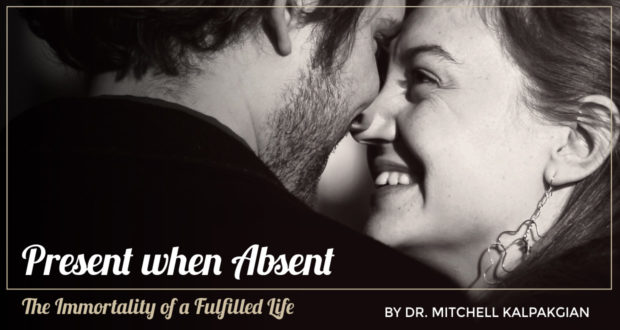United extended families with grandparents, uncles, aunts, nieces, nephews, and cousins are spirited clans that bring a fullness of joy into the world.
Read More »
Dr. Mitchell Kalpakgian November 23, 2014 11,946 Views
United extended families with grandparents, uncles, aunts, nieces, nephews, and cousins are spirited clans that bring a fullness of joy into the world.
Read More »Dr. Mitchell Kalpakgian October 22, 2014 5,583 Views
by Dr. Mitchell Kalpakgian | A person who has died or is absent for long periods can live forever in memory; "Some memories are realities, and are better than anything that can ever happen to one again."
Read More »Dr. Mitchell Kalpakgian October 15, 2014 10,526 Views
It was the last week of St. Gregory’s Armenian School and Camp in East Falmouth, Massachusetts. On this Sunday in August, Father Luke Arakelian delivered one of the most memorable ...
Read More »Dr. Mitchell Kalpakgian October 8, 2014 27,060 Views
by Dr. Mitchell Kalpakgian | “Well done, good and faithful servant.” Christ is indeed lavish in his praise.
Read More »Dr. Mitchell Kalpakgian September 30, 2014 7,763 Views
by Mitchell Kalpakgian | In one of the Father Brown detective mysteries, a select group of men known as “The Twelve True Fishermen,” meet once a year for an annual club dinner at the fashionable Vernon Hotel.
Read More »Dr. Mitchell Kalpakgian August 12, 2014 6,640 Views
by Mitchell Kalpakgian | Man’s play, however, is not limited to the realm of athletics or the Olympics. The playful mind sees old truths in fresh images.
Read More »Dr. Mitchell Kalpakgian August 5, 2014 15,057 Views
by Mitchell Kalpakgian | The imagination means the ability to be inventive, creative, and resourceful. However, the imagination can also mean...
Read More »Dr. Mitchell Kalpakgian July 29, 2014 10,433 Views
by Mitchell Kalpakgian | The magnanimous man is large-hearted enough to take into consideration the humanity of his enemies.
Read More »Dr. Mitchell Kalpakgian July 22, 2014 5,829 Views
by Mitchell Kalpakgian | While God works miracles to heal, to feed, and to resurrect the dead, He does not perform wonders to amaze the crowds...
Read More »Dr. Mitchell Kalpakgian July 8, 2014 5,650 Views
by Mitchell Kalpakgian | Science separated from God and the common good and removed from morality and wisdom presumes to be an end in itself rather than a means to an end.
Read More »Dr. Mitchell Kalpakgian July 3, 2014 10,452 Views
by Mitchell Kalpakgian | All human beings owe to one another the obligation of being pleasant and enjoyable company instead of being boring, or a burden...
Read More »Dr. Mitchell Kalpakgian June 24, 2014 8,061 Views
by Mitchell Kalpakgian | So often in relationships arguments arise in which both parties are convinced that they deserve an apology for an offense...
Read More »Dr. Mitchell Kalpakgian June 17, 2014 11,243 Views
by Mitchel Kalpakgian | Macbeth learns that daggers draw blood, and murder produces guilt. Man’s conscience and soul are real, alive, and active—especially at night.
Read More »Dr. Mitchell Kalpakgian April 30, 2014 10,163 Views
by Mitchell Kalpakgian | In Willa Cather’s My Antonia, Jimmy Burden, the narrator who relates the story of his life in Nebraska and the lives of the immigrant families who settled in the Midwest, recalls an illuminating moment in his study of Virgil at the University of Nebraska.
Read More »Dr. Mitchell Kalpakgian April 9, 2014 8,235 Views
by Mitchell Kalpakgian | According to the worldly wise, the end justifies the means. If one achieves his ambitions, he need not be scrupulous or squeamish for doing what most people do—even if they are dishonest.
Read More »Dr. Mitchell Kalpakgian March 25, 2014 9,428 Views
by Mitchell Kalpakgian | The custom of visiting on Sundays and holidays, once a natural part of a human life, has waned in the last fifty years. Visitors feel the obligation to call in advance and ask permission lest they impose or inconvenience their hosts. Hosts who receive visitors sense the need to have ample provisions...
Read More »Dr. Mitchell Kalpakgian March 20, 2014 7,825 Views
by Mitchell Kalpakgian | The French phrase “déjà vu” (already seen) carries a negative connotation. If something is déjà vu, it means that one has done something, been someplace, or had an experience that he does not want to repeat, revisit, or undergo again.
Read More »Dr. Mitchell Kalpakgian March 13, 2014 8,058 Views
by Mitchell Kalpakgian | In the “Preface” to The Great Divorce C. S. Lewis explains the nature of moral error in the modern world as an endless progression on the wrong road-- the assumption that all roads sooner or later lead to the same destination.
Read More »Dr. Mitchell Kalpakgian March 8, 2014 8,661 Views
by Dr Kalpakgian | By giving Curdie “some” of the truth Irene led him to “all” of it. By giving Curdie time and being content to be misunderstood for a short period, Irene led her friend to the fullness of the truth. To be a messenger like Irene is to speak the simple truth and let God do the rest.
Read More »Dr. Mitchell Kalpakgian February 25, 2014 7,103 Views
by Mitchell Kalpakgian | According to Chauntecleer, books are the final authority of truth. Pertelote, who stays below in the farmyard, views the subject of dreams exclusively in terms of personal experience. Never in her life does she remember a dream that came true.
Read More »
 Seton Magazine Catholic Homeschool Articles, Advice & Resources
Seton Magazine Catholic Homeschool Articles, Advice & Resources